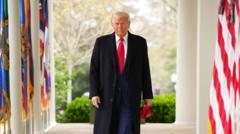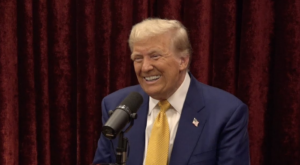President Trump's escalating tariff threats against China are prompting reactions from nations worldwide as many appeal for a de-escalation of trade tensions. On Monday, Trump warned China to revoke its retaliatory tariffs on U.S. goods or face a steep increase, bringing the total tariffs levied on Chinese imports to an astonishing 104% since he took office.
Trump Escalates Tariff Threats Against China Amid Global Economic Pressure

Trump Escalates Tariff Threats Against China Amid Global Economic Pressure
Amid rising tensions, President Trump threatens to impose 50% tariffs on Chinese imports as retaliation escalates. Countries across Asia and Europe respond with mixed strategies to mitigate trade fallout.
In Asia, countries such as Bangladesh and Vietnam have urged Trump to reconsider the timing of the new tariffs, while the Philippines has taken a proactive stance by offering to reduce tariffs on American products to ease tensions. Meanwhile, South Korea and Japan are expressing a desire to engage in dialogue with the Trump administration to find common ground.
On the European front, officials from the European Union are employing a two-pronged strategy. While they propose to cut tariffs on American-made automobiles and other industrial goods, they also prepare retaliatory measures that could include new import taxes targeting American products. An EU vote on the targeted goods is expected to take place soon.
The American stock market reacted to the uncertain trade situation with volatility; the S&P 500 closed down as investors grappled with the implications of potential new tariffs.
Amid this backdrop, significant developments in U.S. immigration policy are also unfolding, including a temporary block by Chief Justice John Roberts on a deportation ruling affecting a Salvadoran individual. As the current administration continues to make sweeping decisions, issues related to data transparency and the expansion of immigrant detention facilities are raising concerns among watchdogs and advocacy groups.
As this trade saga unfolds, stakeholders across the globe remain watchful, hoping for a resolution that will sustain economic stability and foster international collaboration rather than isolationism.
On the European front, officials from the European Union are employing a two-pronged strategy. While they propose to cut tariffs on American-made automobiles and other industrial goods, they also prepare retaliatory measures that could include new import taxes targeting American products. An EU vote on the targeted goods is expected to take place soon.
The American stock market reacted to the uncertain trade situation with volatility; the S&P 500 closed down as investors grappled with the implications of potential new tariffs.
Amid this backdrop, significant developments in U.S. immigration policy are also unfolding, including a temporary block by Chief Justice John Roberts on a deportation ruling affecting a Salvadoran individual. As the current administration continues to make sweeping decisions, issues related to data transparency and the expansion of immigrant detention facilities are raising concerns among watchdogs and advocacy groups.
As this trade saga unfolds, stakeholders across the globe remain watchful, hoping for a resolution that will sustain economic stability and foster international collaboration rather than isolationism.





















